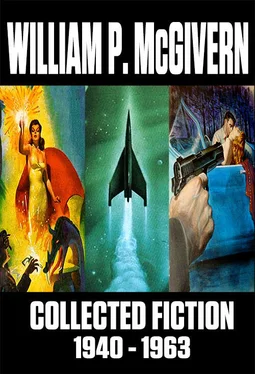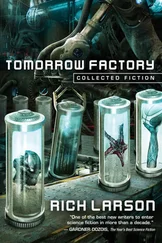Уильям Макгиверн - Collected Fiction - 1940-1963
Здесь есть возможность читать онлайн «Уильям Макгиверн - Collected Fiction - 1940-1963» весь текст электронной книги совершенно бесплатно (целиком полную версию без сокращений). В некоторых случаях можно слушать аудио, скачать через торрент в формате fb2 и присутствует краткое содержание. Год выпуска: 2014, Издательство: Jerry eBooks, Жанр: Ужасы и Мистика, Фантастика и фэнтези, Детектив, Прочие приключения, на английском языке. Описание произведения, (предисловие) а так же отзывы посетителей доступны на портале библиотеки ЛибКат.
- Название:Collected Fiction: 1940-1963
- Автор:
- Издательство:Jerry eBooks
- Жанр:
- Год:2014
- ISBN:нет данных
- Рейтинг книги:3 / 5. Голосов: 1
-
Избранное:Добавить в избранное
- Отзывы:
-
Ваша оценка:
- 60
- 1
- 2
- 3
- 4
- 5
Collected Fiction: 1940-1963: краткое содержание, описание и аннотация
Предлагаем к чтению аннотацию, описание, краткое содержание или предисловие (зависит от того, что написал сам автор книги «Collected Fiction: 1940-1963»). Если вы не нашли необходимую информацию о книге — напишите в комментариях, мы постараемся отыскать её.
Collected Fiction: 1940-1963 — читать онлайн бесплатно полную книгу (весь текст) целиком
Ниже представлен текст книги, разбитый по страницам. Система сохранения места последней прочитанной страницы, позволяет с удобством читать онлайн бесплатно книгу «Collected Fiction: 1940-1963», без необходимости каждый раз заново искать на чём Вы остановились. Поставьте закладку, и сможете в любой момент перейти на страницу, на которой закончили чтение.
Интервал:
Закладка:
Thaddeus Throckmorton, speechless with rage, could only glare helplessly at John Brown as he continued.
“Yes,” said Brown reflectively. “I am going to outfit you — that is, myself, in some decent raiment. Something less ridiculous than what I’m wearing at present.”
“Leave my body alone,” shrieked Thaddeus Throckmorton. “It’s dressed in the best of taste, and I won’t have it looking foolish! Leave those clothes exactly as they are, do you understand me?”
“It’s my body, now,” declared John Brown. “At least my personality is inhabiting it at the moment. I refuse to have my personality dashing about in such ludicrous garments. The body is bad enough, Lord knows, but I don’t have to look like a circus clown on top of it.”
Mr. Throckmorton turned the matter over to the gods, and once his choice selection of epithets was concluded he buried his face — or rather, John Brown’s face — in his hands. “Ohhhhh,” moaned the president of Throckmorton’s Department Store, “oooooohhh!”
“Come, come,” demanded John Brown after several minutes of this, “stop all that carrying on. You don’t hear me complaining, do you? After all, I haven’t got the best bargain in the world from this. There isn’t any sense in crying over spilled personalities.”
Mr. Throckmorton gave him the benefit of an anguished glance. “It’s easy for you to talk,” he sobbed. “But I’m the one to get the worst of this deal!”
“Tush,” cried John Brown. “I think you’ll do well selling washing machines, once you get the knack of it. They’re a lot of fun. Besides, think of the twenty percent commission you’re working on. A man can do a lot on twenty percent commission. In no time at all you ought to be department head.”
“Yes?” said Mr. Throckmorton dubiously.
“Absolutely,” John Brown assured him. “There is plenty of room for promotion in Throckmorton’s. It’s a sort of a slogan, y’know. So you shouldn’t feel amiss starting as a washing machine salesman. There’s plenty of room for promotion.”
“Fluuumph,” said Mr. Throckmorton. “I’d almost forgotten that slogan.”
“I’ve never forgotten it,” said John Brown casually. “I remember hearing it eighteen years ago when I started selling washing machines here.”
Mr. Throckmorton broke out in a new series of groans, and John Brown, smiling quietly to himself, exhaled expensive blue clouds of smoke thoughtfully at the ceiling.
Quite suddenly, Mr. Throckmorton seemed to calm down. Noticing the swift transition of manner, John Brown looked at him in perplexity. Something was wrong somewhere. Throckmorton, in Brown’s body of course, was almost looking pleased. He was whistling a half-tune through his teeth, an old habit of John Brown’s when secretly happy about something.
“Remind me,” John Brown told Mr. Throckmorton, “to discard that irritating whistle when I get my own body back. It’s extremely annoying.”
“I’m very pleased,” smirked Mr. Throckmorton. “Very, very pleased at what I have just remembered.”
“So I gather,” John Brown acknowledged dryly. “I seem to remember my own face well enough to know when it is registering signs of pleasure. Might I ask what it is that makes you look like a cat at a banquet of canaries?”
Mr. Throckmorton rose swiftly. “Nothing,” he lied easily. “I was just thinking, that’s all. Just thinking.”
With that, Mr. Throckmorton crossed to the door and turned momentarily to face John Brown. “Have to be getting downstairs, I suppose. Washing machines to sell, and all that,” he smirked. “Toodle-oo!”
For three minutes John Brown, in his new body, sat staring thoughtfully at the door. Mr. Throckmorton’s exit had left him rather bewildered and vaguely uneasy. What was the ex-president so damned pleased about? Why had the sudden change come over him? John Brown was not long in finding out.
There was a precise tapping on the door, startling Mr. Brown out of his mental misgivings. “Come in,” he snapped. “Come in and stop that damned rat-tat-tat.”
A short, thin, bespectacled young man whom Mr. Brown remembered as being secretary and aide-de-camp to Mr. Throckmorton, stepped into the room. John Brown remembered that his name was Quaggle and that he was a sort of junior executive in the store.
“Well, Quaggle?” Mr. Brown forced his voice to carry the coolness commonly associated with authority.
Quaggle cleared his throat noisily, inserting a thin finger beneath his stiff collar. “Frankly, sir, I’m worried,” he declared throatily. “The situation is serious.”
“What situation?” Brown asked blankly.
Quaggle choked back his amazement, and with reproach dripping from his every word, replied, “Why, the situation, sir, concerning the bank’s refusal to extend your loan.”
If John Brown had been sitting in an electric chair, he couldn’t have been more shocked. Loans, Debts, Trouble, the Three Musketeers of Mr. Brown’s past life, were once more cropping up to plague him in his new existence!
Quaggle continued, apparently unaware of the hunted look that had suddenly crept into the other’s eyes. “What do you plan to do about it, Mr. Throckmorton?”
John Brown realized that a reply was expected — swift, sure, and decisive. John Brown could think of nothing swift, sure, or decisive to say. But he tried.
“It’s an ill wind that hasn’t got a silver lining, Quaggle,” he said reassuringly. “Remember that!”
“Why?” Quaggle asked logically enough.
Brown had a sudden inspiration, remembering a poem from his high school days. “Yours is not to reason why, yours is but to do and die!” he blurted triumphantly.
Quaggle backed toward the door visibly impressed. “Yes, sir. Quite right. It is a pleasure to realize that you are ready to face them!”
John Brown paled. “Face who?” he heard his voice saying weakly.
“Why, the gentlemen from the bank. At the board of directors’ meeting, at two o’clock this afternoon.” He stopped to stare apprehensively at his employer. “What’s wrong? Do you feel ill, sir?”
John Brown was clutching miserably at Throckmorton’s overstuffed midriff. “I have a headache,” he wailed, “and he has to pick this moment to get indigestion. Between the two of us we’re driving me mad!”
This was too much for Quaggle. He flew from the room...
When J. Thaddeus Throckmorton, vested in the person of John Brown, arrived on the floor of the washing machine section he was humming happily. It was almost with a sort of fondness that he gazed at the gigantic display washer which had been the cause of his present state. There were worse fates than being a washing machine salesman. Washing machine salesmen had small worries and smaller salaries. But they were better off, far better off, than department store executives about to be thrown into bankruptcy.
Mr. Throckmorton threw John Brown’s thin shoulders back and inflated John Brown’s chest. For the first time in many moons there was a swagger in John Brown’s manner.
“Jesta minute, fella!”
Mr. Throckmorton felt a hand jab him forcefully between the shoulder blades, and he turned to face a thin, sharp-nosed, moustached individual wearing a belligerent smile.
“Yuh’re John Brown, ain’t yuh?”
Mr. Throckmorton hesitated only a moment. “Yes,” he acknowledged.
“Well, Brown,” the thin man’s beady eyes gleamed triumphantly and he pulled a notebook from his pocket, “I’m from the Acme Loan Company.”
“So,” said Mr. Throckmorton icily, “so?”
The false smile faded from the crooked mouth. “Don’t git uppity, Brown. I ain’t no vassal. I’m here to see that you make yer payment fer last month, or else.”
Читать дальшеИнтервал:
Закладка:
Похожие книги на «Collected Fiction: 1940-1963»
Представляем Вашему вниманию похожие книги на «Collected Fiction: 1940-1963» списком для выбора. Мы отобрали схожую по названию и смыслу литературу в надежде предоставить читателям больше вариантов отыскать новые, интересные, ещё непрочитанные произведения.
Обсуждение, отзывы о книге «Collected Fiction: 1940-1963» и просто собственные мнения читателей. Оставьте ваши комментарии, напишите, что Вы думаете о произведении, его смысле или главных героях. Укажите что конкретно понравилось, а что нет, и почему Вы так считаете.

![Уильям Макгиверн - Завтра опять неизвестность [английский и русский параллельные тексты]](/books/35168/uilyam-makgivern-zavtra-opyat-neizvestnost-angli-thumb.webp)









